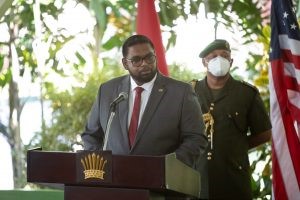President Irfaan Ali skirts US journalist’s question about fairness of Exxon deal
When correspondent Shaun Tandon asked President Irfaan Ali whether the deal is fair, the Head-of-State sidestepped the question and proceeded to tell the Agence France-Presse (AFP) journalist about other plans his administration has for the oil sector.
“The arrangement itself,” Tandon asked Ali, “Do you feel that it’s equitable? Do you feel that it’s fair for Guyana?”
Fielding questions under the Baridi Benab at State House, with US Secretary of State Mike Pompeo, the President only offered that his administration is reviewing the Payara Field Development Plan (FDP), Exxon’s third intended development. Despite lambasting the former David Granger administration for the poor terms in the Stabroek Block agreement on several occasions, the People’s Progressive Party Civic (PPP/C), now in government, refuses to renegotiate the deal.
“We have said even prior to the elections that there are issues that we’ll have to review,” Ali stated, “and as you’re aware, we have at the moment a review in terms of the Payara licence that is being done, and we have subjected ourselves to professional guidance. At the end of that review the government, of course, will have to make an informed decision.”
The government had hired a World Bank advisor and former Alberta Premier, Alison Redford to spearhead a review of the project, as well as to assess the work of Bayphase, the company hired by the former government to review the project. The Stabroek Block agreement, including the intended Payara project, has been widely criticised for its lopsided provisions, some of which Guyana’s laws don’t even allow. The PPP/C government has been challenged to bring the deal into conformity with the law, and to ensure its terms give Guyana a suitable share of the revenue. Global Witness had said that it is such an unfair deal that Guyana will lose US$55B over the life of the agreement.
Tandon having also asked about managing risks in the sector, the President quickly pivoted from his brief comment on Payara, to the administration’s plan to establish a Petroleum Commission, moving the conversation well away from a discussion on the deal.
“We’ve also committed ourselves to arm’s-length relationship with the management of the sector from a political perspective,” Ali said. “So you would not see, for example, the petroleum commission that is controlled by politicians. The management of this resource must be done by competent, qualified, technical persons who can ensure that we get the best output from our oil and gas resources.”
This Commission is a promise the PPP/C has touted for some time now. There is no timeline yet for its establishment.
The President continued, “For us, oil and gas is a great impetus for the macro-economic vision for our country.”
He said that it will allow the government to build and expand other sectors, transform the country’s infrastructure, and foster a competitive “knowledge economy”.
“So oil and gas, I can assure you, will be managed by technically competent people,” he said, alluding to the Petroleum Commission again, before moving on to mention the administration’s plans for the Natural Resource Fund. “Of course, we are now re-looking at the sovereign wealth fund to take away – there was legislation that was passed that added tremendous powers onto the minister who was responsible.”
The PPP/C has criticised the Act, passed by the former government – not only for its provisions, but because it was passed after the government fell by the December 21, 2018 motion of no confidence.
“We have to remove that,” he said, “remove the overwhelming power that is assigned to the Minister so that we can have greater transparency and accountability in the management of this sector.”
Finally, the President referred to the recently appointed advisory panel on local content.
“We are committed to supporting investment in this sector,” President Ali, “and we are committed in ensuring that Guyanese benefit from these investments. That is why we’ve established a technical taskforce to look at local content and to see how we can not only support the local private sector, but how we can build a capacity and ensure that they benefit from local content.”
This is an issue that the new government has made a show of and its appointment of Trinidadian local content expert, Anthony Paul has been lauded. However, the government is reminded that local content cannot be a substitute for a fair deal, as it does not rake in enough to recover the US$55B Guyana is set to lose from the Stabroek Block agreement’s current terms.
Former Presidential Advisor on Petroleum, Dr. Jan Mangal has said that local content is a red herring for the government’s refusal to get a better deal, as oil producing nations do not make the bulk of their revenue from local content.






















